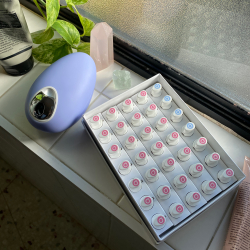
What to Do If You’re Experiencing an Anxiety or Panic Attack
The professionals all agree—just breathe.
Breathe in through the nose, hold, and breathe out through the mouth. It seems that every group meditation or yoga class we have ever attended (whether in person or virtual) espouses this sentiment to decrease our levels of stress. Retrospectively speaking, of course it’s simple for us to relax when we are in dimly lit rooms listening to the soothing voice of an instructor. But how can we carry this into our regular day-to-day routines when a sudden bout of anxiety takes hold of our entire beings, causing our emotions to go into overdrive? Here are some techniques to practice when you are frozen in a state of panic.
Defining the Overdrive
Simply put, a panic attack is an episode where there is intense fear or apprehension that manifests itself physically and emotionally. According to board-certified internist and locum hospitalist in New York Sunitha D. Posina, MD, “Panic attacks are believed to [be] an imbalance in chemicals and hormones. When your body comes across fear, a reaction starts in your amygdala (part of the brain responsible for fear) and it sends signals to the hypothalamus, which stimulates the autonomic nervous system (ANS).” Parts of the ANS cause the adrenal glands to release adrenaline and cortisol, which, according to Dr. Posina, “increases your heart rate, contracts your muscles, dilates your pupils, and puts your body in a fight-or-flight response.”
Panic attacks are short in their duration, and they vary in sensations from person to person because, well, we’re all different. Some of the main ways a panic attack can manifest physically are “shivering, nausea, rapid and uncontrollable hyperventilation, irregular heartbeats, dry mouth, sweating, and dizziness,” says neuropsychologist and faculty member at Columbia University in New York City Dr. Sanam Hafeez. Other symptoms can include tunnel vision, ringing in the ears, and numbness throughout the body.
Unfortunately, our emotions can kick into high gear at any moment, which is why you can experience this influx of stress or anxiety whether working at a desk or simply taking a stroll through the neighborhood. Says Dr. Hafeez, “The cause of panic attacks is not entirely understood. What we know is that family history can play a role, [as can] stress and sensitivity to stress, and a history of anxiety can also be linked to panic attacks. Extreme life events such as losing a job or having a loved one become sick can also trigger a panic attack.”
How to Soothe the Fight-or-Flight
Grounding
When you’re overcome with anxiety, it can feel like an out-of-body experience that never seems to end. An excellent technique to counter this sensation is grounding, aka the act of focusing on your surroundings and your physical body so that you can lasso your mind back to the present and away from the itinerant habit of hopping from one stressful thought to another. Jules Miller, founder of The Nue Co., explains, “the [5-4-3-2-1 grounding technique] includes breathwork while activating the senses including [sight], touch, [hearing], smell, and taste. Psychologists commonly prescribe the technique as it has the potential to pull our brains free from the anxiety by grounding us in the present.”
To begin the technique, sit comfortably in a chair or on the floor. Begin by listing five things you can see in your environment. Then make a mental note of four things you can physically feel, like the softness of your sweater or the warm, dry air coming through your vent, etc. After that, listen for three sounds that you can hear, whether it’s the chair beneath you creaking or perhaps the honking cabs outside your city apartment. Follow this with two things you can smell, like the product in your hair or the scents of your breakfast still lingering in your home. And lastly, make a note of one thing you can taste, even if the taste is just the remnants of the coffee you had an hour ago.
Reiki practitioner and founder of Helen Phelan Studio Helen Phelan reveals another grounding technique she utilizes when a panic attack is setting in. “One of my anxiety hacks is setting up to do a quick breath exercise under my weighted blanket,” she says. “This helps shift my attention from intrusive thoughts back to my physical body with heightened sensory awareness. It doesn’t have to be a full-on meditation, but even two to three minutes consciously breathing while bringing my focus to bodily sensations.”
By focusing the attention to the body, we remind ourselves that our worries, although they may feel material, are just thoughts—they are not putting us in any immediate physical danger.
Aromatherapy
With a sudden influx of essential oils hitting the wellness market, aromatherapy may seem like something that is only en vogue. However, there is real science behind how scent can alter one’s mood. Says Miller, “There’s a powerful connection between cognitive function and the olfactory system; certain scents can elicit certain reactions with the body, both physically and psychologically. The process begins in the nose, where around 450 olfactory receptors detect smells and send signals to the brain for it to decipher.” Once the brain deciphers these scents, it sends signals to the limbic system, which controls mood, memory, behavior, and emotion.
Some essential oils to consider diffusing are mint, lavender, rosemary, chamomile, jasmine, and holy basil, all of which can have a calming and soothing effect on your racing mind. And if you are not into diffusers or do not have the time to set yours up in the midst of an attack, consider a functional fragrance spray or roll-on. Combine these scents with deep-breathing exercises until you feel a sense of ease.
Breathing
Every professional we spoke to recommended breathing as the most effective way to mitigate a panic or anxiety attack. But what exactly is the science behind these various breathing exercises? Acupuncturist and women’s health and pain specialist Dr. Anna Hsieh Gold, DACM, L.Ac, FABORM, explains, “When experiencing a panic attack very suddenly, people start hyperventilating. When you hyperventilate, you have an imbalance of oxygen and carbon dioxide in the body,” where there is more oxygen coming in than carbon dioxide going out. When we regulate our breathing, everything else that is out of balance during a panic attack follows. Here are a few techniques to try when your emotions are out of order.
Licensed psychologist and K-Y’s sex therapist, Dr. Shannon Chavez, recommends to “start with breathing deeply and connecting with your body by placing one hand over your heart and the other over your belly” to ground yourself in the present. Dr. Chavez continues, “Focus on slowing down your breathing and telling yourself [the] simple mantra ‘I am relaxed. I am in control.’” This technique is simple enough for those who have never tried deep-breathing exercises before, yet effective enough for those who meditate twice a day.
Ayurvedic pranayama techniques are also great for slowing down a racing mind and breath. Dr. Gold recommends nadi shodhana pranayama, or an alternate nostril technique. Start by sitting comfortably in a chair or on the floor, and pinch the left nostril with your thumb. Breathe in through the right nostril for five counts, and then squeeze your right nostril with your little finger while simultaneously releasing your thumb from your left nostril. Hold the breath for five counts, and then breathe out of your left nostril for five counts. After that, breathe in through the left nostril and repeat this process. Do this for about five minutes or until your heightened emotions subside.
Additionally, Dr. Gold recommends the 4-7-8 breathing technique. This pranayama technique requires you to inhale through the mouth for four counts, hold the breath for seven counts, and then exhale the breath for eight counts. This allows your body to regulate the imbalance of oxygen and carbon dioxide.
A Change of Scenery
Oftentimes the setting in which the emotional spike occurs can exacerbate your negative emotions. Think about it: If you’re panicking about a situation at work and don’t remove yourself from your desk (or wherever you work these days), remaining in the exact location that sparked your attack will only prolong it. Consider leaving the room where the attack came about, whether that is going for a nature walk or simply entering a different room.
Dr. Gold recommends going for a walk around the neighborhood because “when we’re outside, something that we always do is look up at the sky. When you are looking up at the sky, you’re actually opening your chest,” allowing for deeper breaths. Yet, Dr. Hafeez warns, “Stepping outside may help, but only if you are well enough to do so, because it may cause more panic if you feel embarrassed to be seen by strangers while you are in distress.” Essentially, do what feels right for you, whether that is going for a walk around the block or entering a private room to decompress.
And suppose you find yourself in public or at a (socially distant) gathering with friends, without the ability to be alone or go for a wellness walk. In that case, Phelan suggests “finding a safe place, even if it means excusing yourself to the bathroom where you can concentrate on getting a hold of your breath” and remaining there until your emotions subside.
Phone a Friend
This may seem obvious to some, but having a support system of friends and loved ones is critical for success. And we don’t just mean having a group of friends to laugh with during Sunday brunch. We’re talking about the deep connections, BFFLs, soul siblings—however you want to phrase it: the people with whom you feel comfortable sharing your deepest emotions. Amanda Chantal Bacon, founder of Moon Juice, suggests, “Get up and hug someone; you’ll get a nice hit of oxytocin, which will be altering. Call a friend and tell them you are having a hard time. Be comfortable with being vulnerable with your friends. I find a quick laugh/cry session with a friend can really put things into perspective.”
And don’t be afraid to be explicit about what exactly it is you need right now. A simple phrase like I’m going through a tough time right now, are you emotionally available to listen to me vent? is an effective way to tell a loved one that you do not require life advice or a shift in perspective; all you really need right now is to talk through your emotions and have someone lend an open ear. If you do need advice, the phrase I’m having a hard time right now, and I don’t know what to do. Are you emotionally available to help me sort some thoughts out? will do the job.
Although you are going through a rough time, it is imperative to first check in with friends about their emotional availability. For all you know, they may be going through something right now, too. The key here is to understand that if they are emotionally unavailable at the moment, this does not mean that they do not care about you—they are just not in the right state of mind or in the right setting to be fully present with you. All the more reason to build a more robust support system with multiple people.
Preparation Is Paramount
Unfortunately, since emotions tend to heighten almost spontaneously, there is not always a way to prevent panic attacks from coming about. But there are methods to prepare yourself. Dr. Gold states, “Practice breathing, meditation, and mindfulness on a day-to-day level so that if a panic attack arises, you have the tools [to self-soothe]. It’s almost like it’s a muscle that you flex every day—you know you have them when you need them.”
And don’t be afraid to seek help. Phelan states, “If panic is something [that] you’re experiencing to a life-disturbing degree, there’s NOTHING saying you can’t meditate AND take medication.” Talking to a therapist or psychologist will help you on your journey to finding out what works best for you in the moments where your heightened emotions just won’t calm down.
Want more stories like this?
How to Build Emotional Resilience Right Now
How Adaptogens Actually Work to Quell Your Stress
This Ancient Beverage Might Be the Key to Relieving Your Stress










